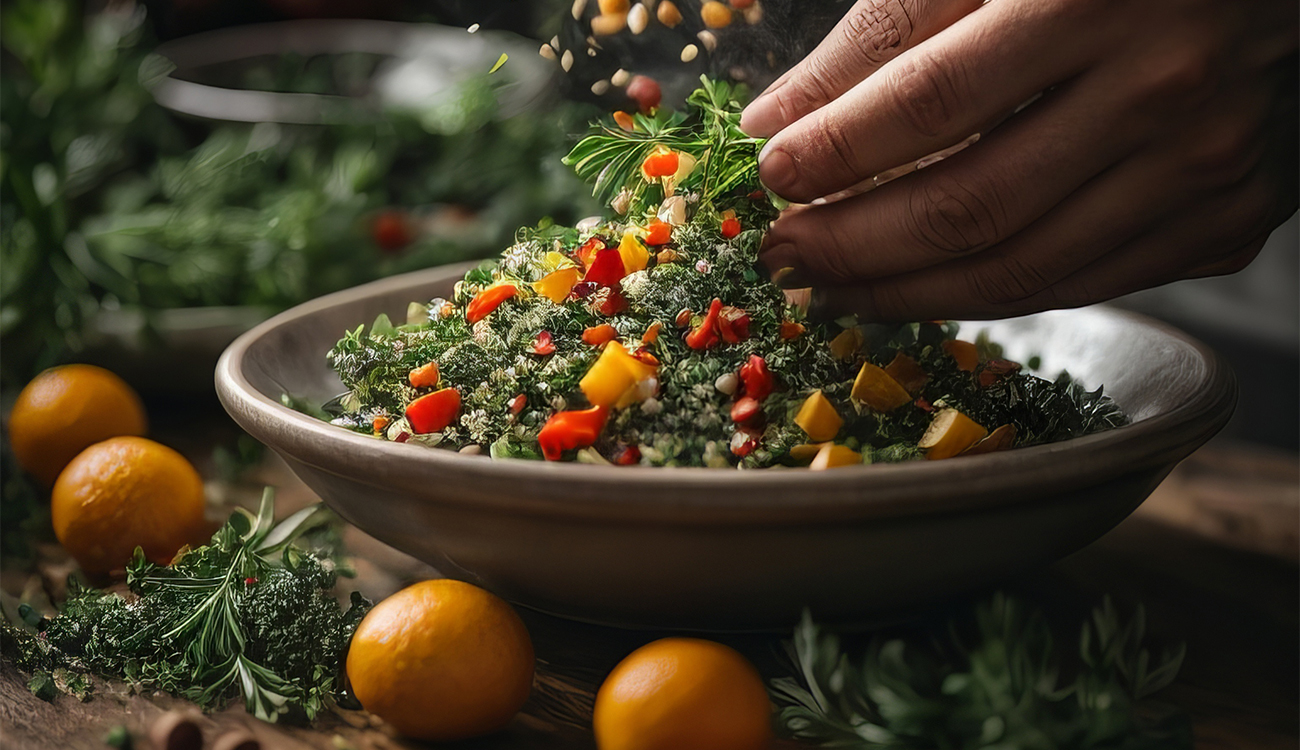
Sunday September 29 2024 | Blogs
Imagine the gentle fragrance of rosemary mingling with a sizzling roast, or a sprig of basil brightening up a creamy tomato sauce. Fresh herbs are like nature’s magic ingredient—they have the power to transform even the simplest dishes into something special, elevating both flavor and presentation.
Cooking with fresh herbs is one of the easiest ways to make your meals taste more vibrant, aromatic, and refined. From everyday dinners to special occasions, knowing how to use herbs can add an extra layer of elegance and enjoyment to your cooking. Let's explore how these fresh little wonders can bring your dishes to life.
Fresh herbs can be categorized into two main types: tender herbs and woody herbs. Understanding the difference is key to using them properly.
The trick to making the most of herbs is knowing when and how to use them. Once you master this, you’ll find that fresh herbs can become the secret weapon in your culinary arsenal.
Herbs aren’t just about taste—they can turn an ordinary dish into a visual masterpiece. Imagine a plate of grilled fish, garnished with bright green sprigs of dill, or a bowl of pasta with delicate basil leaves sprinkled on top. Using herbs as a garnish can make a meal look more polished and professional.
Pro Tip: Herb Bouquet Garnish
Instead of a single herb, try using a small bouquet of herbs as a garnish. Mix together different types, such as basil, cilantro, and parsley, to add both visual appeal and layers of flavor. This works beautifully for soups, salads, and even platters of roasted vegetables.
Herb butter is an easy way to elevate a meal, and it’s incredibly versatile. By mixing softened butter with fresh herbs, you create a flavorful spread that can be used in countless ways—think of it as an instant upgrade for your cooking.
Use rosemary and thyme herb butter for roasted chicken, dill and lemon zest herb butter for seafood, or basil and garlic herb butter to spread over warm bread. The flavor combinations are endless, and they’re an easy way to add gourmet flair to even the simplest dishes.
Making Your Own Herb Butter
To make herb butter, finely chop your chosen fresh herbs and mix them with room-temperature butter. Add a pinch of salt, a little minced garlic, or even some citrus zest to enhance the flavors further. Roll the butter into a log using parchment paper and refrigerate until firm—it’s that simple!
Herb-infused oils and vinegars are another way to bring fresh herbs into your cooking, adding an elegant depth of flavor without much effort.
Knowing which herbs to pair with different types of food is the secret to unlocking their full potential. Here’s a handy guide to some classic herb pairings:
Sauce Pairings: Using Harleys Sauces with Fresh Herbs
Pairing sauces with fresh herbs can take their flavor to another level. Try mixing Harleys Royal Ranch with a handful of finely chopped chives for a tangy dip that’s perfect for veggies or wings. Or add a dash of King Mustard with freshly chopped dill to create a unique sauce for grilled salmon.
Marinades are one of the simplest ways to infuse dishes with the flavor of fresh herbs. For a classic herb marinade, combine olive oil, lemon juice, garlic, salt, and a mixture of chopped herbs like oregano, thyme, and parsley. Let your meat, fish, or even vegetables soak in this aromatic blend before cooking.
Herbs work well in marinades because they infuse the food with their flavor while breaking down proteins, making them tender and juicy. For grilled chicken, consider a rosemary, lemon, and garlic marinade; for beef, try thyme and red wine.
Fresh herbs are wonderful—but they also have a short shelf life. To make the most of them, you need to store them properly.
If you have more herbs than you can use, consider freezing them. Chop your herbs, place them in an ice cube tray, and cover them with olive oil before freezing. Herb cubes are perfect for adding to soups, stews, or sautés.
Adding herbs to your salads can completely change their flavor profile. Instead of relying solely on lettuce, try including a variety of fresh herbs. Mint, cilantro, basil, and parsley can all be used to add complexity and freshness to your salads.
For an elegant herb salad, combine arugula with a handful of fresh herbs, a drizzle of herb-infused oil, and a sprinkle of sea salt. This light, fragrant salad pairs beautifully with rich dishes and makes an impressive side for dinner parties.
When cooking with fresh herbs, timing is everything. The delicate nature of tender herbs means they lose their flavor if cooked for too long. To preserve their brightness, always add them at the end of cooking. Basil, cilantro, and parsley should be stirred in just before serving, ensuring their flavor shines.
Woody herbs can be added earlier in the cooking process. When making a stew or roast, add rosemary or thyme at the beginning to allow their rich, earthy flavors to develop fully. You can even tie woody herbs together into a bouquet garni for easy removal later.
Fresh herbs are a game-changer in the kitchen. They add depth, complexity, and a burst of flavor that can turn any meal into something special. Whether you’re garnishing a dish, whipping up an herb butter, or creating a fresh marinade, herbs are the secret ingredient that will elevate your cooking.
So next time you’re at the market, grab a few bundles of fresh herbs and experiment. Mix basil with Harleys Hero Ketchup to create a unique pasta sauce, or add thyme to Real BBQ Sauce for a savory glaze. Let fresh herbs inspire your cooking, and watch as they take your dishes from ordinary to extraordinary. With just a few simple sprigs, your kitchen can become a garden of flavor waiting to be explored.